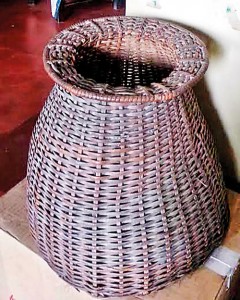R.I.P dear old W.P.B.
I am writing this tribute to the Waste Paper Basket [WPB], a once-essential item of office equipment, exactly 63 years after it first came my way in the ramshackle old Kachcheri in Trincomalee where I took my first faltering steps into Government Service, that wilderness of red tape and humanity, where I spent much of my working life. Avuncular Mr. Amirthalingam, the Extra Office Assistant (EOA in Kachcheri-speak), took me under his wing and installed the fledgling District Land Officer (DLO) at a desk in the Land Branch equipped with a steel pen, bottles of red and blue ink, a pink blotting pad, red and blue pencils, a hard eraser, wooden trays marked ‘In’ and ‘Out’ and flanked by my own WPB to be the repository of my rejected drafts.

A souvenir from the past: The old-style WPB
This last item, a conical object of woven cane, amused me no end – till I learnt to appreciate its usefulness in that era of paper-full offices. It was the instant container of discarded drafts, anonymous petitions, discarded envelopes, inky Roneo papers and over-used carbon papers. In this present age of computer print-outs and photo-copiers, the last two items need ‘translation’. The Gestetner Roneo printer was a messy machine that had to be fed sticky black ink and, operated by a peon (antique designation!) printed hundreds of copies originally typed on some special oily paper. Carbon papers were used when a few copies had to be made. The first three copies or so were okay, but later ones were unreadably fuzzy and relegated to the WPB. Our files were made up of blue carbon copies on flimsy paper. Our WPBs were cleared daily and, once a week, the whole bundle of WPB contents went up in a bonfire in the Kachcheri compound – supervised by a clerk to ensure they were not smuggled to a ‘botal-karaya’.
One never queries the origins of items that surround our everyday life. So it was with the WPB. It was everywhere in government offices – and that was that. However, many years later in Anuradhapura my good friend the Superintendent of Prisons told me of the intimate connection between the WPB and our Penal System. The Prison system believed in training its inmates in ‘useful’ occupations. They wove sheets, towels and sarongs for government hospitals, manufactured washing soap, shoes for their guards and, of course, wove cane WPBs for government offices. Contractors delivered bundles of cane gathered from villages in the jungle. Prisoners then peeled and split these long canes into smaller strips for weaving into WPBs. The weavers had been trained by guard instructors who ensured quality control, adherence to approved model, and designated output.
It has been recorded that during the WW II incarceration of the LSSP escapees who were assigned this task these cosseted youths suffered terribly from bleeding fingers and split nails. The finished product was then sent to the government officers that had ordered them. Years later, when I was Government Agent of Trincomalee I came across a few rural entrepreneurs foraging for wild cane in the brush jungle of Seruwila to be sold to the Prisons Department.
For the next few years there was no great change in the ‘waste’ that ended up in our WPBs – old carbons, over-used blotting paper, greasy Roneo paper, drafts and discarded petitions in ‘broken’ English. Then came the “great upset of 1956”. It slowly seeped into government offices. Sinhala as the new Official Language transformed once-familiar designations. ‘Peon’ became ‘Karyala Karya Sahayaka’(KKS) and the Waste Paper Basket became ‘Kunu Kooduwa’ (but, strangely, continued to be referred to as WPB). There was an initial increase in the volume of stuff that filled our WPBs as ‘old entrants’ who had been educated in English, struggled to readjust themselves to writing, memos and letters in Sinhala. Our initial forays into the Official Language stuffed full our WPBs.
Old JRJ’s Open Economy trumpeted the Last Post for the WPB. Tons of cheap plastic containers flooded the market and the old cane WPBs were no longer economical. ‘Baskets’ in pastel colours now decorate government offices – adequate for today’s almost paper-less office work.
However, the WPB is as ‘undead’ as Count Dracula. Our political cartoonists relish drawing unpopular politicians and their policies peering out of the old style WPB into which they have been flung. A neat bit of artistic shorthand.
As an octogenarian veteran of government service I believe it is important to remember its past and honour that now almost forgotten item of office equipment, the Waste Paper Basket, which made our work so easy. In conclusion, I have a confession to make – in a corner of my home there hides an old WPB that I extracted as a souvenir from my last Kachcheri. I only hope I will not be hauled before the FCID or CIABOC for this misdemeanour.


